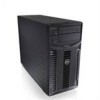Dell PowerEdge T410 Hardware Owner's Manual - Page 42
System Messages - remote power on
 |
View all Dell PowerEdge T410 manuals
Add to My Manuals
Save this manual to your list of manuals |
Page 42 highlights
• Clear the SEL - You can perform this task remotely, but you will lose the event history for the system. • Power cycle - Turn off the system and disconnect it from the electrical outlet; wait approximately ten seconds, reconnect the power cable, and restart the system. Any of these actions will remove fault messages, and return the status indicators and LCD colors to the normal state. Messages will reappear under the following conditions: • The sensor returns to a normal state but fails again, resulting in a new SEL entry. • The system is reset and new error events are detected. • A failure is recorded from another source that maps to the same display entry. System Messages System messages appear on the screen to notify you of a possible problem with the system. NOTE: If you receive a system message not listed in the table, check the documentation for the application that is running when the message appears or the operating system's documentation for an explanation of the message and recommended action. Table 1-3. System Messages Message Causes Corrective Actions 128-bit Advanced ECC mode disabled. For 128-bit Advanced ECC, DIMMs must be installed in pairs. Pairs must be matched in size and geometry. The Advanced ECC option enabled in BIOS is no longer valid due to an unsupported memory configuration, possibly a faulty or removed memory module. The Advanced ECC setting has been disabled. Check other messages for a faulty memory module. Reconfigure the memory modules for Advanced ECC mode. See "System Memory" on page 106. 42 About Your System















